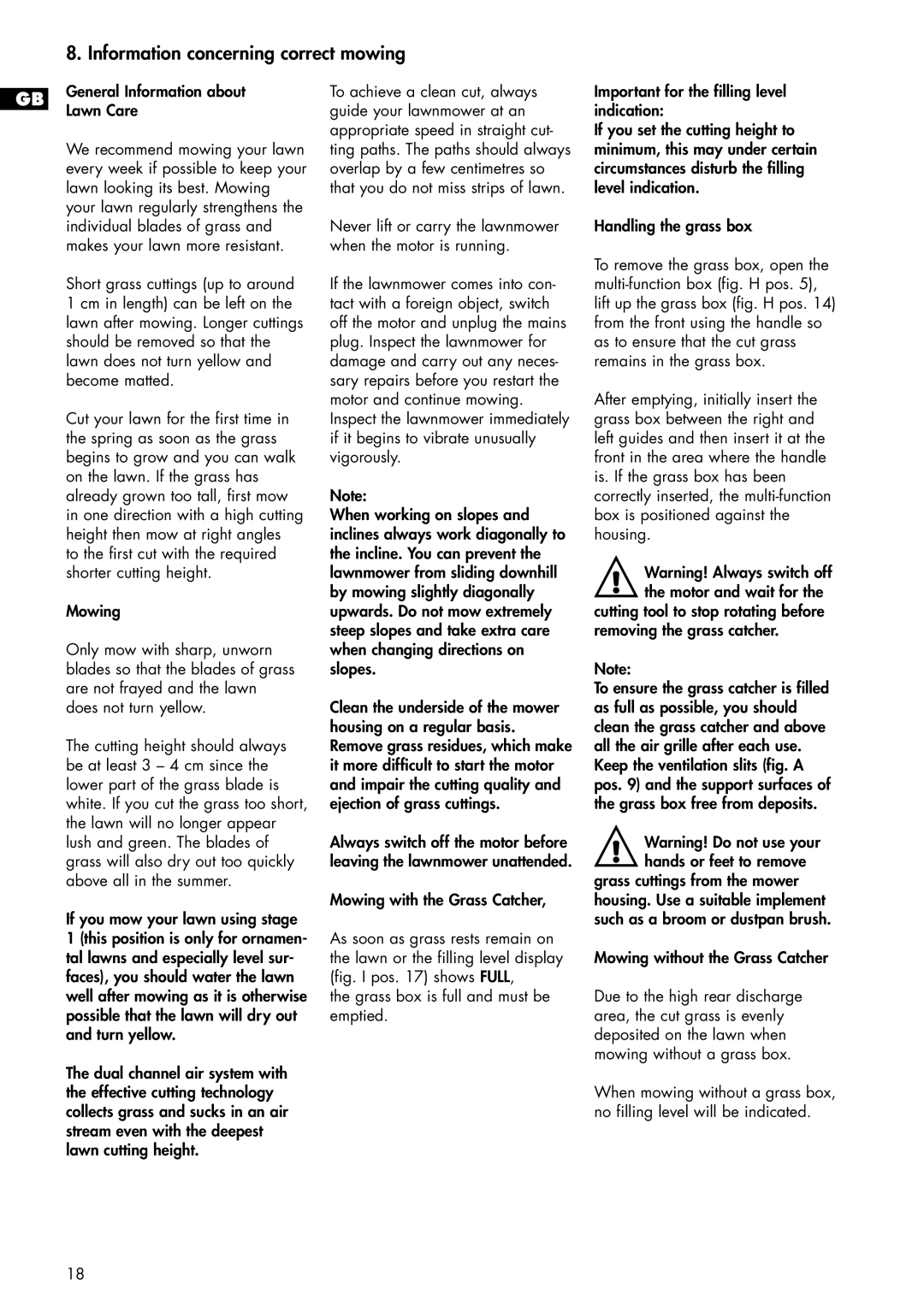8. Information concerning correct mowing
| General Information about | |
GB | ||
Lawn Care | ||
| ||
| We recommend mowing your lawn | |
| every week if possible to keep your | |
| lawn looking its best. Mowing | |
| your lawn regularly strengthens the | |
| individual blades of grass and | |
| makes your lawn more resistant. | |
| Short grass cuttings (up to around | |
| 1 cm in length) can be left on the | |
| lawn after mowing. Longer cuttings | |
| should be removed so that the | |
| lawn does not turn yellow and | |
| become matted. | |
| Cut your lawn for the first time in | |
| the spring as soon as the grass | |
| begins to grow and you can walk | |
| on the lawn. If the grass has | |
| already grown too tall, first mow | |
| in one direction with a high cutting | |
| height then mow at right angles | |
| to the first cut with the required | |
| shorter cutting height. | |
| Mowing | |
| Only mow with sharp, unworn | |
| blades so that the blades of grass | |
| are not frayed and the lawn | |
| does not turn yellow. | |
| The cutting height should always | |
| be at least 3 – 4 cm since the | |
| lower part of the grass blade is | |
| white. If you cut the grass too short, | |
| the lawn will no longer appear | |
| lush and green. The blades of | |
| grass will also dry out too quickly | |
| above all in the summer. | |
| If you mow your lawn using stage | |
| 1 (this position is only for ornamen- | |
| tal lawns and especially level sur- | |
| faces), you should water the lawn | |
| well after mowing as it is otherwise | |
| possible that the lawn will dry out | |
| and turn yellow. | |
| The dual channel air system with | |
| the effective cutting technology | |
| collects grass and sucks in an air | |
| stream even with the deepest | |
| lawn cutting height. |
To achieve a clean cut, always guide your lawnmower at an appropriate speed in straight cut- ting paths. The paths should always overlap by a few centimetres so that you do not miss strips of lawn.
Never lift or carry the lawnmower when the motor is running.
If the lawnmower comes into con- tact with a foreign object, switch off the motor and unplug the mains plug. Inspect the lawnmower for damage and carry out any neces- sary repairs before you restart the motor and continue mowing. Inspect the lawnmower immediately if it begins to vibrate unusually vigorously.
Note:
When working on slopes and inclines always work diagonally to the incline. You can prevent the lawnmower from sliding downhill by mowing slightly diagonally upwards. Do not mow extremely steep slopes and take extra care when changing directions on slopes.
Clean the underside of the mower housing on a regular basis. Remove grass residues, which make it more difficult to start the motor and impair the cutting quality and ejection of grass cuttings.
Always switch off the motor before leaving the lawnmower unattended.
Mowing with the Grass Catcher,
As soon as grass rests remain on the lawn or the filling level display (fig. I pos. 17) shows FULL,
the grass box is full and must be emptied.
Important for the filling level indication:
If you set the cutting height to minimum, this may under certain circumstances disturb the filling level indication.
Handling the grass box
To remove the grass box, open the
After emptying, initially insert the grass box between the right and left guides and then insert it at the front in the area where the handle is. If the grass box has been correctly inserted, the
Warning! Always switch off Athe motor and wait for the cutting tool to stop rotating before removing the grass catcher.
Note:
To ensure the grass catcher is filled as full as possible, you should clean the grass catcher and above all the air grille after each use. Keep the ventilation slits (fig. A pos. 9) and the support surfaces of the grass box free from deposits.
Warning! Do not use your Ahands or feet to remove grass cuttings from the mower housing. Use a suitable implement such as a broom or dustpan brush.
Mowing without the Grass Catcher
Due to the high rear discharge area, the cut grass is evenly deposited on the lawn when mowing without a grass box.
When mowing without a grass box, no filling level will be indicated.
18
